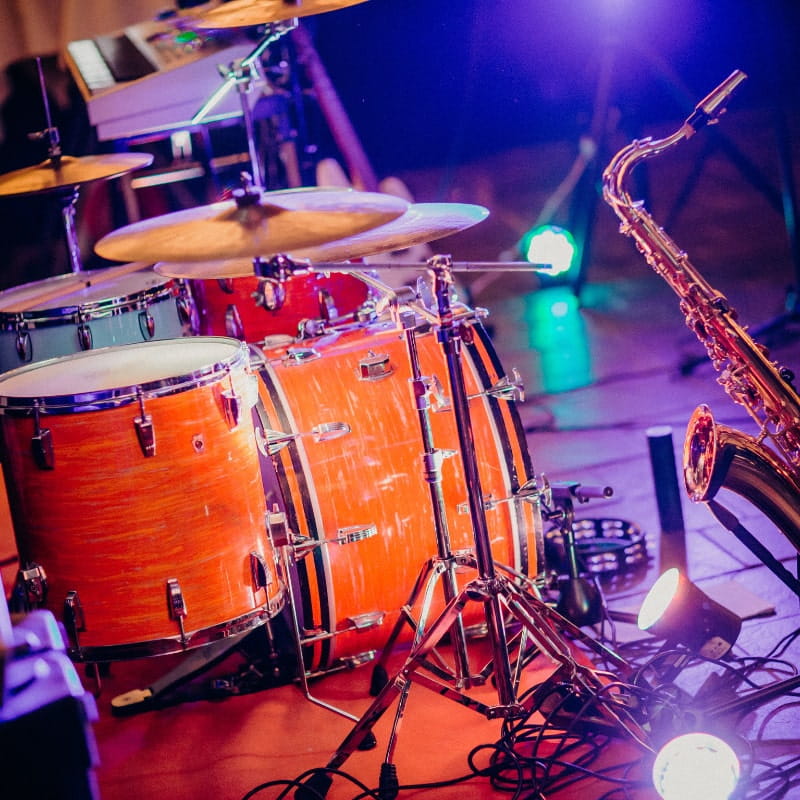Protecting your equipment at summer gigs and festivals
There’s nothing quite like playing live at a summer festival or gig. The sun’s out, the crowd is buzzing and the vibes are high. It’s what dreams are made of. But, it’s also when your gear is at its most vulnerable. Whether you’re playing an instrument on an outdoor stage in front of a packed crowd or DJing in a tent filled with fans, there are a whole host of different issues you’ve got to be prepared for.
If you’re gigging this summer, here’s how to keep your gear safe, secure and ready to rock. As you’ll see, it isn’t just the elements you need to be prepared for.
Plan ahead for hot days
Festivals are all about music in the sun. But hot days aren’t great for your gear. Left in direct sunlight or in the back of a hot van, a guitar neck can warp, drum skins can stretch, foot pedals start acting up and synths can simply stop working. Ideally keep your equipment in hard cases because as well as protecting them during transport, they also act as safe zones against the elements. But even then, they’re not 100% safe, so don’t leave anything in a hot car or van for long as they’ll soon heat up. If you’re storing gear outside between sets, cover it with a reflective blanket to deflect sunlight.
Watch out for humidity
Summer heat often comes with sticky humidity. This can be a major problem for wooden instruments like guitars, violins, cellos and even wooden drum shells. This is because wood can expand and contract with moisture, which then leads to warping, cracking or tuning problems. Play it safe by always wiping your instruments down after playing to remove any moisture or sweat. Especially guitars and drumsticks. Also, put silica gel packs in your instrument cases to help absorb excess moisture. If you’re touring with really expensive acoustic instruments, you might want to invest in a humidifier/dehumidifier pack or two. They’re a fraction of the cost of replacing an instrument.

Be ready for rain
Every festival goer knows that it’s not all blue skies. It can rain. Heavily. So be prepared. It might be a sudden, unexpected downpour or a non-stop monsoon weekend, but either way, your gear needs protecting. Pack waterproof covers or tarps. If you’re not on a covered stage, use a pop-up gazebo. It’s also worth getting water-resistant gig bags and pedalboard cases.
Guard against salt corrosion
If you’re playing by the sea, one hidden danger is salt corrosion. In fact, some metals can start to corrode after just 24 hours exposed to a marine atmosphere. This includes the metal strings on a guitar! To help avoid issues, wipe everything down after you’ve played and again use silica packs to absorb moisture.
Protect cables
It’s easy to take cables for granted. Until they develop a fault and then you’re in trouble trying to find a replacement in the middle of a field. So, treat them with respect. Don’t let them get trampled on, baked on a stage or soaking wet. Use cable ties or velcro to keep them nice and tidy. It makes them less likely to be damaged. To be on the safe side always carry spares.
Label everything
You know what gear’s yours, but backstage when everyone has black instrument cases or someone has the exact same deck as you, things can get complicated. Labelling everything, including cables, before you hit the road is always a smart move. Especially as smaller accessories like foot pedals can sometimes be lent to other musicians and then it’s easy to forget who borrowed what from who.
Protect against theft
Having gear stolen is everyone’s worst nightmare. But it unfortunately happens at festivals as thieves see them as easy pickings due to everyone else treating them as laid back, friendly affairs. Which to be fair, 99% of the time they are. The first rule is never leave anything unattended. This includes when you first arrive and are unloading. Leaving the van doors open while everyone heads off carrying as much as they can is an open invitation. Either make sure someone stays at the van or coordinate trips so someone is always there. It’s also worth tying your equipment down in your vehicle with bungee cords or rope so someone can’t just pick up an instrument and walk off with it.
It’s also well worth taking photos of all your instruments and equipment, as well as keeping a record of their serial numbers. Then, if something does get stolen, you can give the police the best chance of getting it back. It’s also the evidence you’ll need to prove something is yours if you lose it and someone else finds it.
Finally, have a checklist of everything you’re taking. It’s easy for something small, but no less expensive, to go missing without being noticed until you get home.
Pack an emergency kit
Don’t forget to take a bag of extras in case of emergency. These can include anything from spare picks, strings and batteries to multi-tools, tape and cable testers. Basically, anything that will avoid a last-minute panic that you can’t get easily when at a festival in the middle of nowhere.



